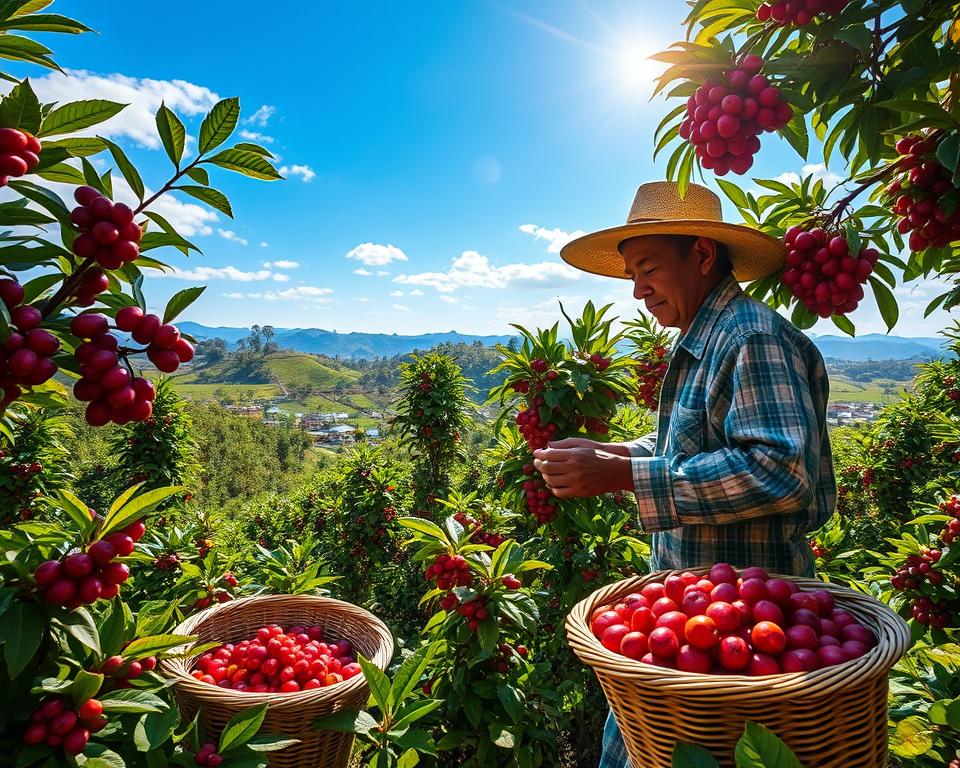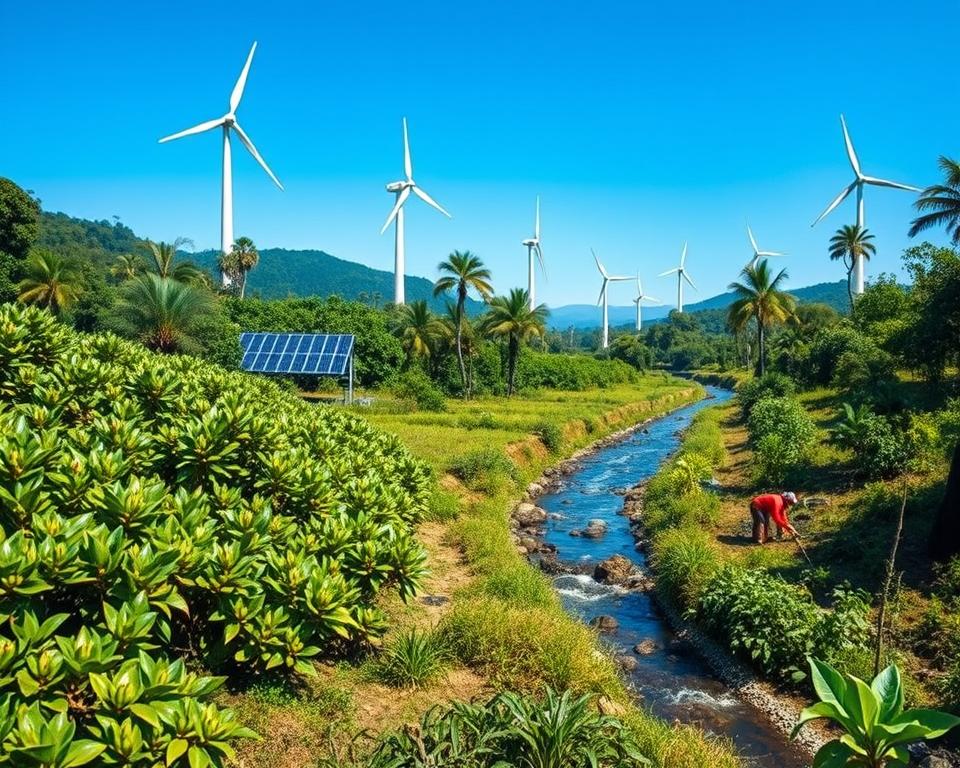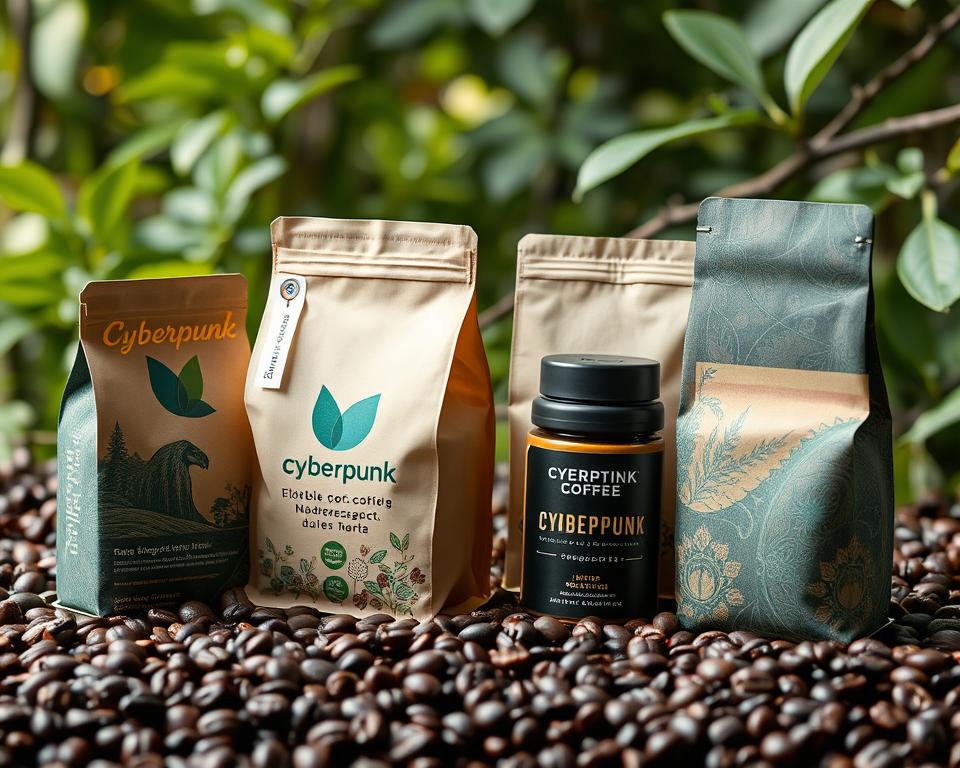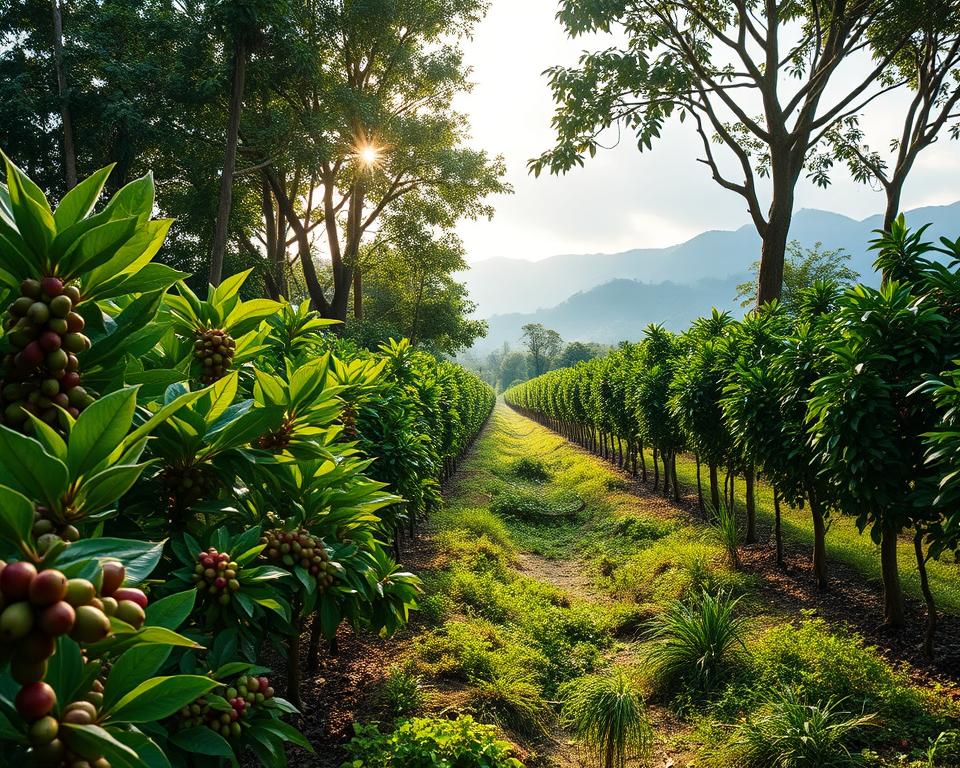Supporting local coffee farmers is crucial for sustainability and ethical sourcing. When we choose wisely and join community initiatives, we help shape a fairer coffee industry.
Buying fair trade coffee is a great way to help. It ensures farmers get fair pay, securing their income and reducing poverty. Fair trade also supports sustainable farming like shade-grown coffee, which protects biodiversity and bird habitats.
Educating ourselves about reputable fair trade groups and purchasing directly from them is key. This not only ensures fair wages but also gives farmers economic power. It boosts their ability to negotiate and take control of their lives.
Another way to help is by raising awareness. We can host events, workshops, or use social media to promote ethically sourced coffee. By spreading the word, we help build a sustainable, fair global coffee market.
Understanding Fair Trade Coffee
Our buying habits can greatly affect coffee farmers and their communities. Fair Trade coffee ensures they get fair pay and ethical treatment. Let’s explore how Fair Trade coffee benefits everyone involved.
Fair Treatment of Farmers
Fair Trade coffee means farmers are fairly paid, securing them a stable income. It safeguards them against unpredictable market changes. Fair Trade USA and Fairtrade America set these fair standards, stabilizing life for around 900,000 farmers in 31 countries. They’ve fixed Arabica coffee’s minimum price at $1.80 per pound and Robusta’s at $1.20 per pound.
Additionally, Fair Trade certification helps with Community Development Funds. These funds support healthcare, education, and vital services. This significantly boosts the well-being of coffee-growing areas.
Sustainable Farming Practices
Environmental care is key in Fair Trade coffee production. Farmers adopt organic methods and preserve biodiversity, reducing harmful chemical use. Such eco-friendly decisions keep ecosystems safe and align with ethical coffee principles.
About 923,000 metric tons of coffee come from these certified farmers. Supporting sustainable farming improves our coffee and helps the environment.
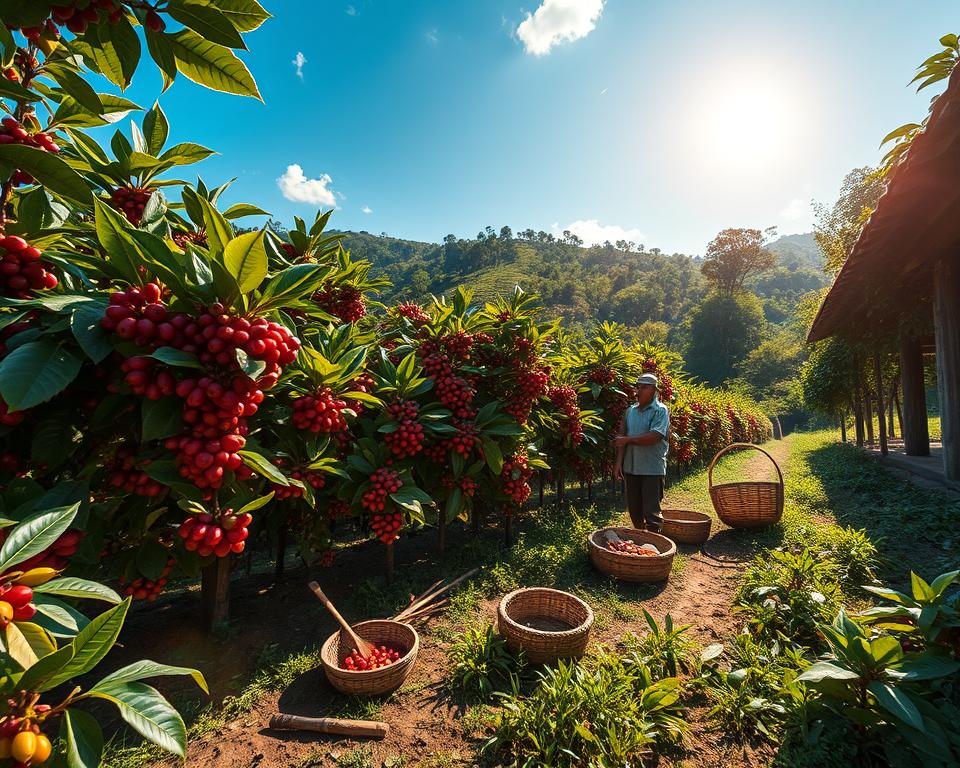
Positive Social and Environmental Impact
Fair Trade does more than just offer economic gains. It combats child labor and champions gender equality in farming. Almost €400 million in Fairtrade Premiums have improved community facilities, bettering lives.
Backing Fair Trade coffee is more than a trend—it’s a push for a brighter future. By preferring Fair Trade, we make a real impact. As Fair Trade coffee popularity skyrockets, our choice for ethical, sustainable coffee becomes ever so vital.
For a deep dive into ethical coffee, this guide on Fair Trade might interest you. Also, check this article on coffee and heart health.
Recognizing the Limitations of Fair Trade
Fair Trade certification helps coffee farmers get fair pay and supports sustainable farming. But, it has its limits, mainly because the minimum price guarantee mostly helps cooperatives, not the individual farmers. This issue leaves some small-scale producers facing slim profits and high costs to get certified.
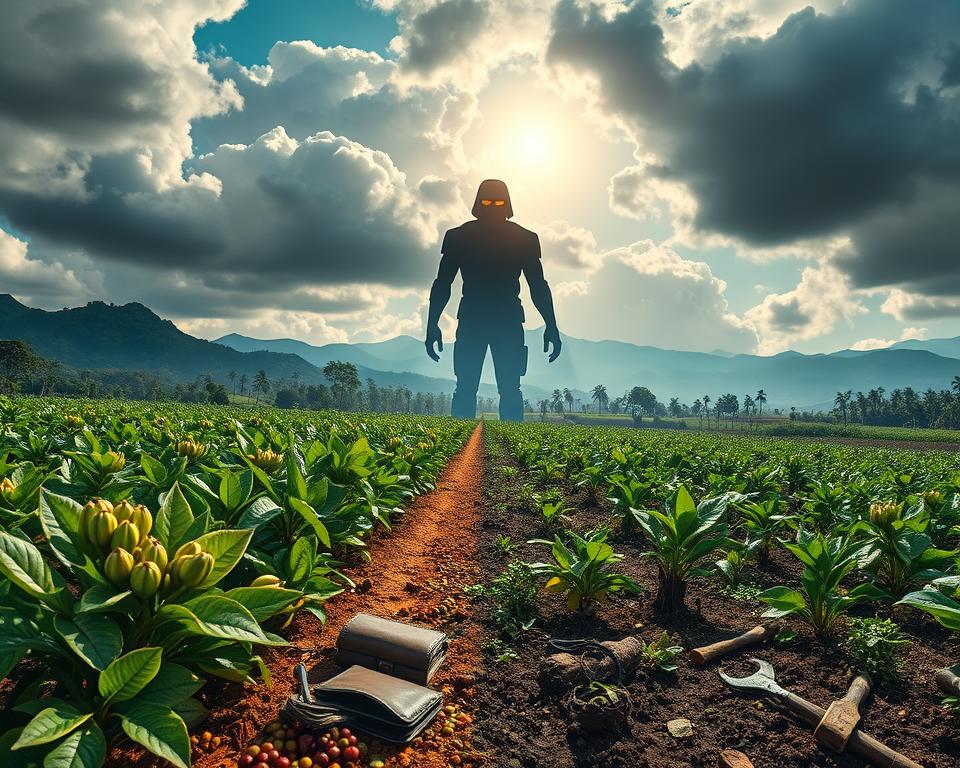
Beyond Fair Trade: Direct Trade
The coffee industry is now looking at Direct Trade as a better option. Direct Trade creates a closer link between coffee roasters and farmers. It’s more open and often gives better deals to everyone involved. Farmers who focus on quality often get higher prices for their crops.
Personalized Pricing Agreements
In Direct Trade, prices are set by talking about production costs and crop quality. This encourages farmers to work on their crops’ quality. These deals not only pay for the costs but also reward top-quality products. This way, farmers get a steady income, letting them plan and invest in their farms better.
Empowering Farmers through Direct Relationships
Direct Trade is about more than just money. It’s about roasters and farmers working together to improve farming methods and life quality. This partnership helps not just the coffee but also the community’s future. It makes the coffee business more ethical and sustainable, with a strong focus on empowering farmers.
Supporting Local Coffee Farmers
Supporting local coffee farmers can really help their lives and our community’s economy. Let’s look at ways to help:
Buying from Local Coffee Shops
Buying from local coffee shops is an easy way to support them. These shops buy directly from the farmers. This means farmers get a fairer part of the profits. Choose these shops over big chains for quality coffee and to help the coffee industry grow sustainably.
Participating in Community Programs
Joining community participation programs is another good way. These programs teach sustainable coffee growing and help farmers. By getting involved, you support local coffee farmers in bettering their methods and the environment.
Creating Demand for Local Coffee
Your demand for local coffee is key. It pushes businesses to buy from local farmers. This leads to more coffee shop support for local coffee, boosting the local economy. By choosing and promoting local coffee, you can make a big impact.
Support through coffee shop support, community participation, and demanding local coffee builds a strong, sustainable local coffee industry. This benefits everyone involved.
Promoting Gender Equality in Coffee Farming
Promoting gender equality in coffee farming is essential. It’s important because women play a big role in this industry. They are heavily involved but often don’t have the same ownership or say in decisions. To fix this, we need to support women’s empowerment and sustainable coffee efforts.
Women’s Role in Coffee Farming
In coffee regions like Sumatra, women do everything from planting to harvesting. They are key to coffee production. But, they face barriers like lack of access to money, resources, and land rights. These issues stop them from reaching their full potential in coffee farming.
Success Stories: Female Coffee Farmers
There are amazing stories of female coffee farmers succeeding with the right support. Take Doris from Guatemala, for example. She saw big improvements after joining the Empowered Families, Thriving Communities Project. This project connects them to Nespresso’s supply chains. Doris now has more confidence and even leads her farm with her husband. They make decisions together about money, their kids, and the farm. Doris makes sure her daughters know they can dream big and challenge gender norms.
Supporting Initiatives for Women Farmers
It’s crucial to support initiatives that empower female coffee farmers. When we give women access to education, funds, and market info, we make a big difference. This help improves their lives and benefits their communities too. For example, the Maya Poq’omchi women in Guatemala have excelled in coffee marketing. Their success shows the power of focused support.
Spreading Awareness and Advocacy
Raising awareness and engaging in coffee advocacy are crucial. They help support ethical coffee farming practices. By telling others about fair trade and sustainable production, we can make a big difference in the industry.
Educating Others
Educating people about fair trade coffee is key. It’s important to talk about the difference in price between fair trade and non-fair trade coffee. We also need to share the social and environmental benefits.
Hosting educational events or coffee tastings can offer firsthand experiences. This shows the quality of ethically sourced coffee.
Organizing Events and Workshops
Planning events and workshops helps raise awareness about coffee advocacy. These educational events can have expert talks and interactive sessions. They highlight the challenges coffee farmers face and the good that comes from fair trade.
By joining these activities, people can learn and share knowledge about ethical coffee production. This creates a more aware consumer base.
Social Media Campaigns
Using social media for coffee-related awareness is highly effective today. Creating engaging content and sharing success stories can spread the word about fair trade coffee. Platforms like Instagram and Facebook reach many people, connecting supporters of ethical coffee farming.
With social media campaigns, we can boost engagement and backing for fair trade. Everyone can help support these initiatives.
How Did Colonial Coffee Trade Routes Impact the Lives of Local Coffee Farmers?
The colonial coffee trade routes significantly disrupted the lives of local coffee farmers. These routes prioritized export over local needs, often leading to harsh working conditions and low wages. Farmers were pressured to produce high-quality beans for foreign markets, undermining their agricultural practices and affecting their communities’ sustainability.
Conclusion
As we finish talking about helping local coffee farmers, it’s key to see the big picture. Our choices and actions pave the way to a sustainable coffee world. This includes ethical buying, supporting fair trade, and backing small farmers.
Choosing fair and directly traded coffee means pushing for fair treatment and sustainability. This helps farmers around the world, especially as most face poverty. By joining community programs and preferring local coffee, we boost local economies and coffee quality.
Gender equality in coffee farming enhances communities too, with women playing key roles after harvesting. By educating, advocating, and using social media, we can spread our message wider. Practices like agroforestry also protect the environment and biodiversity.
Let’s stick to supporting fair pay, gender equality, and sustainable methods. This ensures our coffee benefits everyone in its journey from farm to cup.
FAQ
How can I support local coffee farmers?
You can help local coffee farmers by buying fair trade coffee. Also, shop at local coffee places that get their beans nearby. Join community programs that focus on sustainable coffee. By doing these, your choices and efforts can greatly help farming communities.
What is Fair Trade Coffee?
Fair Trade Coffee ensures farmers are treated fairly. It promises fair prices, supports sustainable farming, and betters work conditions. By buying Fair Trade Coffee, you help farmers get fair pay. This leads to better healthcare and education for them.
Why is sustainable coffee important?
Sustainable coffee farming is vital. It supports organic farming, saves biodiversity, and cuts harmful chemicals use. Choosing sustainable coffee helps our environment. It also boosts the health of communities making coffee.
What are the positive impacts of Fair Trade Coffee?
Fair Trade Coffee has many good points. It reduces child labor and supports gender equality. This helps communities grow and keeps our ecosystem safe. By choosing Fair Trade, we make the coffee world fairer and greener.
What are the limitations of fair trade?
One downside of fair trade is it’s mainly for cooperatives, not solo farmers. Also, getting fair trade certified can be expensive and tough for some farmers.
What is direct trade coffee?
Direct trade coffee means roasters and farmers work closely. This setup is transparent and often means more money for farmers. It rewards quality and sustainability. Farmers are encouraged to produce better crops.
How do personalized pricing agreements benefit coffee farmers?
These agreements cover production costs and pay extra for quality. So, farmers are motivated to use better farming techniques. This leads to superior crops and more income for them.
How can I create demand for local coffee?
To boost demand for local coffee, support nearby coffee shops. They should value local farmers. Share the perks of local coffee. Getting involved in community programs also supports local farmers.
What role do women play in coffee farming?
Women are key in making coffee but often lack control. Backing projects that empower women in coffee farming promotes gender equality. This can bring economic and social gains to their communities.
Are there examples of successful female coffee farmers?
Yes! Take the Maya Poq’omchi women in Guatemala, for example. They’ve advanced in producing and selling coffee. Their success boosts efforts to empower women in the coffee industry globally.
How can I spread awareness about fair trade and sustainable coffee practices?
Raising awareness means teaching others at events or workshops and using social media. Sharing info about fair trade and eco-friendly coffee gets more people involved. This helps make coffee sourcing ethical and fair.

